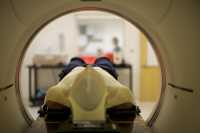
07 Aug MRIs Improve Targeting of Biopsies for Prostate Cancer Diagnosis
MedicalResearch.com Interview with:
Dr Martha Elwenspoek PhD
Research Associate in Epidemiology and Health Services Research
NIHR CLAHRC West,
Bristol
MedicalResearch.com: What is the background for this study?
Response: Prostate cancer is one of the most common cancers in men. Prostate cancer is usually diagnosed by taking 10 to 14 systematic samples from the prostate guided by ultrasound. However, these biopsies are unpleasant for patients, can miss cancer even when it’s present, can misclassify the severity of the cancer, and can cause side effects, such as bleeding and infection.
If biopsies could be targeted better, men wouldn’t have to undergo so many and there would be less risk of getting a misleading result. Multiparametric MRI (mpMRI) scans are sometimes used before doing a biopsy to help diagnose prostate cancer, and while this approach is now being recommended by the UK National Institute for Clinical Excellence (NICE) their use isn’t widespread.
MedicalResearch.com: What are the main findings?
Response: We reviewed all randomized controlled trials that compare the standard procedure with using pre-biopsy mpMRI for biopsy-naïve men with suspected prostate cancer.
Our review found that the use of pre-biopsy mpMRI combined with targeted prostate biopsy was better in detecting clinically significant cancers (i.e. cancers that require treatment) while fewer biopsy cores were taken per procedure. Our results also suggest that including mpMRI in the diagnostic pathway for prostate cancer may avoid unnecessary biopsies for some men and may lead to reduced side effects.
MedicalResearch.com: What should readers take away from your report?
Response: These findings suggest that using an mpMRI to inform prostate biopsies is superior to the standard pathway and they support the use of mpMRI and a targeted biopsy to diagnose prostate cancer. However, before mpMRI can be implemented in standard practice the availability of mpMRI scanners needs to be improved and radiologists and urologists need appropriate training to interpret mpMRI images and to perform mpMRI-guided biopsies.
MedicalResearch.com: What recommendations do you have for future research as a result of this work?
Response: Because only one study included in our review reported biopsy complications, more evidence is needed to show whether reducing the number of cores per biopsy procedure will reduce the risk of side effects. Future research should perform longer follow-ups to confirm if side effects are indeed reduced in the MRI biopsy pathway. There are still concerns that clinically significant cancers may be missed in patients with negative mpMRI results. Future research should investigate whether combining the scans with other measures, such as PSA density, can mitigate these risks.
MedicalResearch.com: Is there anything else you would like to add?
Response: The research is supported by the National Institute for Health Research (NIHR) Collaboration for Leadership in Applied Health Research and Care West (CLAHRC West) at University Hospitals Bristol NHS Foundation Trust. The views expressed are those of the author(s) and not necessarily those of the NHS, the NIHR or the Department of Health.
Citation:
[wysija_form id=”3″]
[last-modified]
The information on MedicalResearch.com is provided for educational purposes only, and is in no way intended to diagnose, cure, or treat any medical or other condition. Always seek the advice of your physician or other qualified health and ask your doctor any questions you may have regarding a medical condition. In addition to all other limitations and disclaimers in this agreement, service provider and its third party providers disclaim any liability or loss in connection with the content provided on this website.
Last Updated on August 7, 2019 by Marie Benz MD FAAD
